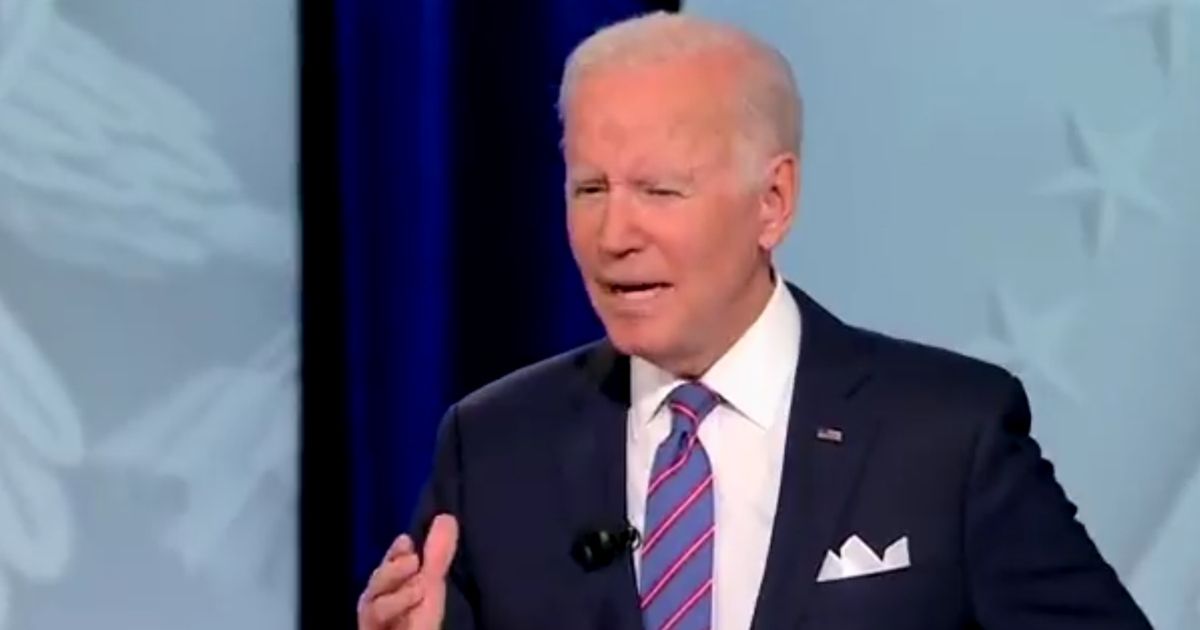When questioned about the spike in gasoline prices at the CNN town hall on Thursday night, President Joe Biden stumbled and bumbled through his non-answer and ultimately said it depends on Saudi Arabia and a few other things “in the offing.”
Biden told CNN’s Anderson Cooper, “I don’t see anything that’s going to significantly reduce gas prices right now. My guess is you’ll start to see gas prices come down as we get by going into the winter, I mean excuse me, into next year in 2022.”
Biden on high gas prices:
“I don’t have a near term answer…It’s going to be hard.”
— Election Wizard (@ElectionWiz) October 22, 2021
The lofty prices Americans are paying at the pump didn’t happen by accident; this has been part of the progressive plan for years. Simply put, Democrats are convinced that if they can drive up the prices of fossil fuels to prohibitive levels, consumers will seek alternatives like electric cars.
Nine months ago, Biden was handed a country that was no longer dependent upon middle eastern tyrants for oil, the lifeblood of the U.S. economy. On day one, this administration set out to reverse that.
Forbes’ energy analyst David Blackmon wrote in March that the prices of fossil fuels began rising as soon as Biden won the election. Well aware of his administration’s planned policies, traders began driving up prices.
According to Blackmon, “The markets clearly see the Biden/Harris Administration as one that will work to inhibit U.S. oil production, which will also have the effect of tightening the global market, and traders have responded by driving up the price of crude oil.”
Traders were right. Hours after receiving the greatest honor of his life, Biden scribbled his name on an executive order revoking the permit for the Keystone XL pipeline.
Another executive order placed a 60-day moratorium on new oil and natural gas leases and drilling permits on federal lands and waters.
In May, Axios reported that the Biden Administration had agreed to waive sanctions on the company building the Nord Stream 2 pipeline into Germany.
Two months later, despite his “opposition” to the controversial project, Biden struck a deal with German Chancellor Angela Merkel to allow its completion.
The Biden administration’s deliberate efforts have worked all too well — perhaps even a bit faster than they had anticipated.
#California average #gasprices now just 15 cents away from reaching their all-time high of $4.67/gal set in 2012 (when Chevron’s Richmond refinery caught fire). It could happen by the holidays.
— Patrick De Haan ⛽️? (@GasBuddyGuy) October 21, 2021
Do you think the Biden presidency has diminished America?
Although today’s higher gas prices are the direct result of the Democrats’ carefully orchestrated plan, the administration has reason for concern. After all, higher prices at the pump have a much greater effect on lower- and middle-income earners. And we are headed into what’s expected to be a bruising midterm election season for their party.
Hence, the administration has made some feeble attempts to mitigate the problem — temporarily.
Over the summer, Biden urged members of OPEC to increase their output of oil. Consider the optics of a U.S. president having to beg Middle Eastern leaders to produce more oil just nine months after being handed an energy-independent country.
Late last month, Reuters reported that National Security Adviser Jake Sullivan traveled to Saudi Arabia to meet with Saudi Crown Prince Mohammed bin Salman, ostensibly to discuss the war in Yemen. White House press secretary Jen Psaki “said oil was also ‘of concern’ and on the agenda.”
Of course it was. It was likely the sole reason for the trip.
A White House spokesperson told Reuters, “The national security adviser and his team reiterated the imperative of creating conditions to support global economic recovery in his meetings earlier this week.”
The article noted that the Biden administration had “previously said such conditions include having more oil on the market to stop rising energy prices and help the economic recovery from the COVID-19 pandemic.”
We should not be relying on Saudi Arabia for anything. This administration is projecting weakness on the world stage — again. It’s humiliating at best. At worst, it threatens our national security.
On October 13, the U.S. Energy Information Administration reported that Americans would be spending up to 54 percent more to heat their homes this winter.
That same day, Reuters reported that Biden had called on U.S. oil and gas producers to help relieve pressure on oil prices.
Fox News contributor Mark Thiessen appeared on the network’s program “The Faulkner Focus” to weigh in.
“Higher gas prices are a result of deliberate choices. The Biden Administration declared war on fossil fuels. They have made clear that they intend to put the fossil fuel industry out of business,” Thiessen said. “So we’ve got now only about 528 oil rigs pumping oil—which is half of what it was in 2019 under Trump. That is a result of—when you tell a business you’re going to put them out of business, they’re not gonna drill new wells, and Wall Street’s not gonna invest in the fossil fuels industry, so they’re exacerbating that.”
By every metric, the Biden administration has been an abject failure.
Nine months in, America is already much diminished. Most of us could have predicted the consequences of a Biden victory.
Our eyes turn to those who put petty grievances above what they knew was best for America. They voted for a man who was clearly slipping into dementia. They voted for a man who had struck a deal with Vermont Sen. Bernie Sanders, a self-described democratic socialist, from whom the party had just commandeered the nomination. Biden agreed to advance his progressive agenda in return for his cooperation.
These voters are looking very foolish at the moment. Let’s hope they put a little more thought into their midterm voting decisions.
This article appeared originally on The Western Journal.

























 Continue with Google
Continue with Google